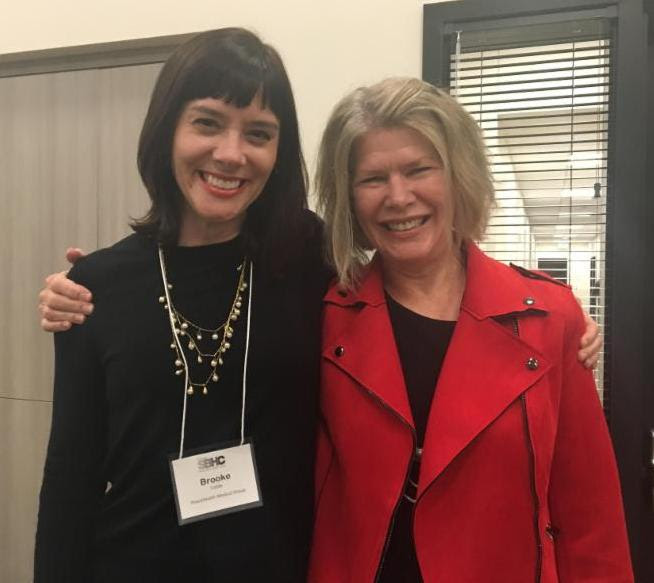7 January 2019 By Anonymous (not verified)
We are always thrilled to hear about Oregon SBHCs taking innovative approaches to providing care to youth. Bethel Health Center is one of those SBHCs.
OSBHA Executive Director Laurie Huffman (pictured right) recently sat down with Bethel Health Center Director Brooke Cottle (pictured left) to discuss community partnerships, youth mental health, and more.
 Laurie Huffman: Thanks for meeting with me today. I'm interested in hearing a little bit about what you do with school-based health. Where do you work and what is your role?
Laurie Huffman: Thanks for meeting with me today. I'm interested in hearing a little bit about what you do with school-based health. Where do you work and what is your role?
Brooke Cottle: I’m the director at the Bethel Health Center, and this is my fourth year. We make sure to take care of all the kids in the Bethel School District, and we also serve staff members and their families. We have one school-based health center in our district and it serves 11 schools. That’s a lot of schools! What do you see as one or two of the greatest needs of the students that you serve? We’re finding a lot of students needing support with mental health, so we do our very best to make sure they’re getting the services that they need. We have mental health therapists on-site. We also have really strong community connections, so that if we do need to refer so patients can get a higher level of care, we make sure they’re getting the very best. We serve as a really important access point for them, so that they can just come right over from school or stop by and have someone that they can talk to.
I’ve heard something about your community connections and how that has expanded capacity to serve youth, and how you have connected with University of Oregon. Can you describe more about that?
Sure! What we’ve really worked hard to figure out is funding. We need to provide more services with limited funding. So we do have a partnership with the University of Oregon, and it’s through their LMFTs (Licensed Marriage and Family Therapists) who are in the second year of the program. This year we brought in two interns to help meet the need at our elementary schools. We also have a program where we’re working with the PhD program at the University of Oregon. They’re using our site at least one day a week, when we don’t have one of our therapists in (we have two office spaces for our therapists). So what we’ve found is that those community partnerships have created avenues for more kids to access services through partnerships. That is key for us.
That sounds wonderful. And are these services provided to students and other patients regardless of their ability to pay?
Absolutely. We bill insurance whenever we can, but then for students who may be seeking confident services, or students who just don’t have the ability to pay, we write that off. We’ve had plenty of experiences where kids have been told by parents that they shouldn’t come back because of the cost, so we’re really careful to explain that we will not be billing you the difference for our mental health services because we know it’s those repeated therapeutic sessions that really make a difference for kids. So we tell them, “We’re going to bill your insurance, and then anything that isn’t covered we will write off, and we will work hard to receive grant funding to cover the difference.”
I’m sure that makes a big difference for many of the youth. How did you first get connected with University of Oregon?
It’s actually through the Lane County Collaborative. We have an SBHC collaborative specific to Lane County. They came and presented at one of our meetings, and talked about the services that they’re offering at the University of Oregon in their clinic there, and threw out the idea that they’d been working with schools and would be willing to partner. So of course we got on the phone as fast as we could to let them know we would love to offer that to kids.
It’s so great to hear how that connection happened, and all of the other ways that you’re expanding services to youth in your community.
Thank you to Brooke! For more on the Lane County SBHC Collaborative, visit their website.
Sign up for the OSBHA newsletter & you'll get interviews like this one in your inbox.
OSBHA Executive Director Laurie Huffman (pictured right) recently sat down with Bethel Health Center Director Brooke Cottle (pictured left) to discuss community partnerships, youth mental health, and more.
 Laurie Huffman: Thanks for meeting with me today. I'm interested in hearing a little bit about what you do with school-based health. Where do you work and what is your role?
Laurie Huffman: Thanks for meeting with me today. I'm interested in hearing a little bit about what you do with school-based health. Where do you work and what is your role?
Brooke Cottle: I’m the director at the Bethel Health Center, and this is my fourth year. We make sure to take care of all the kids in the Bethel School District, and we also serve staff members and their families. We have one school-based health center in our district and it serves 11 schools. That’s a lot of schools! What do you see as one or two of the greatest needs of the students that you serve? We’re finding a lot of students needing support with mental health, so we do our very best to make sure they’re getting the services that they need. We have mental health therapists on-site. We also have really strong community connections, so that if we do need to refer so patients can get a higher level of care, we make sure they’re getting the very best. We serve as a really important access point for them, so that they can just come right over from school or stop by and have someone that they can talk to.
I’ve heard something about your community connections and how that has expanded capacity to serve youth, and how you have connected with University of Oregon. Can you describe more about that?
Sure! What we’ve really worked hard to figure out is funding. We need to provide more services with limited funding. So we do have a partnership with the University of Oregon, and it’s through their LMFTs (Licensed Marriage and Family Therapists) who are in the second year of the program. This year we brought in two interns to help meet the need at our elementary schools. We also have a program where we’re working with the PhD program at the University of Oregon. They’re using our site at least one day a week, when we don’t have one of our therapists in (we have two office spaces for our therapists). So what we’ve found is that those community partnerships have created avenues for more kids to access services through partnerships. That is key for us.
That sounds wonderful. And are these services provided to students and other patients regardless of their ability to pay?
Absolutely. We bill insurance whenever we can, but then for students who may be seeking confident services, or students who just don’t have the ability to pay, we write that off. We’ve had plenty of experiences where kids have been told by parents that they shouldn’t come back because of the cost, so we’re really careful to explain that we will not be billing you the difference for our mental health services because we know it’s those repeated therapeutic sessions that really make a difference for kids. So we tell them, “We’re going to bill your insurance, and then anything that isn’t covered we will write off, and we will work hard to receive grant funding to cover the difference.”
I’m sure that makes a big difference for many of the youth. How did you first get connected with University of Oregon?
It’s actually through the Lane County Collaborative. We have an SBHC collaborative specific to Lane County. They came and presented at one of our meetings, and talked about the services that they’re offering at the University of Oregon in their clinic there, and threw out the idea that they’d been working with schools and would be willing to partner. So of course we got on the phone as fast as we could to let them know we would love to offer that to kids.
It’s so great to hear how that connection happened, and all of the other ways that you’re expanding services to youth in your community.
Thank you to Brooke! For more on the Lane County SBHC Collaborative, visit their website.
Sign up for the OSBHA newsletter & you'll get interviews like this one in your inbox.

